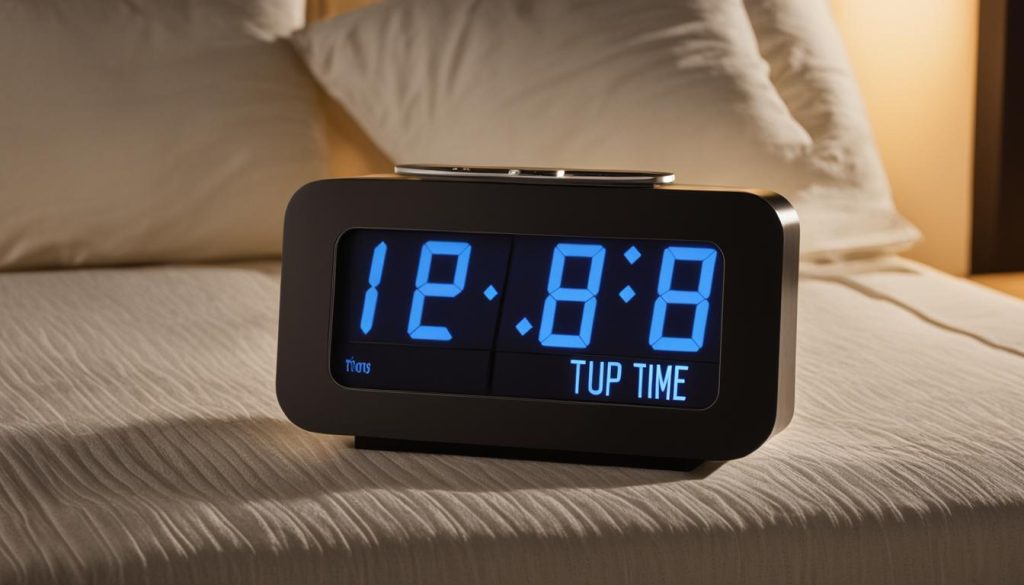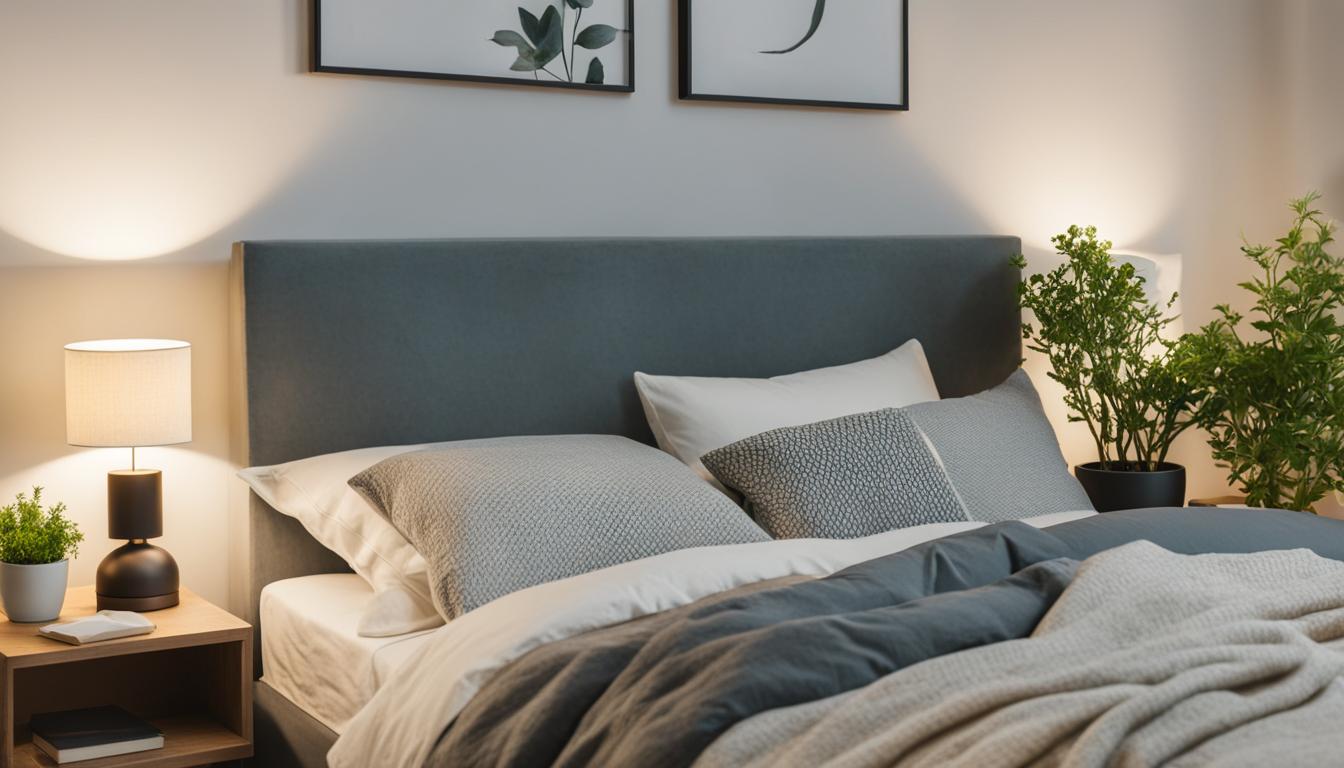When it comes to achieving quality sleep, there’s more to it than simply closing your eyes and hoping for the best. Sleep hygiene, a term used to describe a set of habits and practices that promote better sleep, is key to improving your overall sleep quality. By incorporating these tips into your bedtime routine, you can enhance your rest and wake up feeling refreshed and rejuvenated.
Key Takeaways:
- Follow these tips to improve your sleep hygiene and enhance your sleep quality.
- Stick to a consistent sleep schedule to reinforce your body’s natural sleep-wake cycle.
- Pay attention to your diet and create a restful sleep environment.
- Limit daytime napping and engage in regular physical activity.
- Manage worries and stress through journaling or relaxation techniques.
Stick to a Sleep Schedule
Establishing a consistent sleep schedule is crucial for maintaining good sleep hygiene. It involves going to bed and waking up at the same time every day, even on weekends. This helps regulate your body’s internal clock and promotes a healthy sleep-wake cycle.
I recommend aiming for the recommended amount of sleep, which is seven to eight hours for adults. Adequate sleep is vital for overall well-being, as it improves cognitive function, mood, and physical health.
If you’re struggling with falling asleep within 20 minutes, it’s best to get out of bed and engage in a relaxing activity. This avoids associating your bed with restlessness and helps you feel sleepy when you return. You can try reading a book, practicing deep breathing exercises, or listening to calming music.
Here is a visual representation of the recommended sleep schedule:
| Age Group | Recommended Sleep Duration |
|---|---|
| Adults (18 – 64 years) | 7-9 hours |
| Elderly (65+ years) | 7-8 hours |
Sticking to a sleep schedule helps optimize the quality of your sleep, ensuring that you wake up feeling refreshed and energized. It also minimizes the risk of sleep debt, which can accumulate when you consistently don’t get enough sleep. By prioritizing your sleep schedule, you prioritize your overall well-being.

Pay Attention to Your Diet and Environment
Your eating and drinking habits and the environment you create in your bedroom can greatly influence the quality of your sleep. By making mindful choices and creating a restful atmosphere, you can enhance your sleep experience.
Eating and Drinking Habits
When it comes to eating and drinking before bedtime, it’s important to strike a balance. Avoid going to bed overly hungry as this can lead to discomfort and difficulty falling asleep. On the other hand, going to bed overly full can cause indigestion and disrupt your sleep. It’s best to have a light snack, such as a piece of fruit or a small bowl of yogurt, if you feel hungry before bedtime.
Additionally, be mindful of your intake of stimulants like nicotine and caffeine. These substances can interfere with your ability to fall asleep and stay asleep. It’s best to avoid consuming them close to bedtime. Instead, opt for calming herbal teas like chamomile or lavender.
Creating a Restful Environment
Designing a restful sleep environment plays a crucial role in promoting better sleep. Consider the following tips:
- Keep your bedroom cool, ideally between 60 to 67 degrees Fahrenheit, for optimal sleep comfort.
- Ensure your bedroom is as dark as possible. Invest in blackout curtains or wear an eye mask to block out any unwanted light that can disrupt your sleep.
- Minimize exposure to light-emitting screens, such as smartphones and tablets, before bed. The blue light emitted by these devices can interfere with your body’s natural sleep-wake cycle.
- Consider using earplugs or a white noise machine to block out any disruptive noises that may disturb your sleep.
Creating a soothing and restful sleep environment can help set the stage for a peaceful night’s rest.

Avoid using fictitious names and titles such as ‘John Doe’, ‘name X, Y, Z’, ‘XYZ’, ‘name A, B, C’, etc. in your writing. Always use real names and brands to ensure authenticity.
Limit Daytime Napping and Stay Active
When it comes to optimizing your sleep routine, it’s important to strike a balance between daytime napping and physical activity. While short and strategic daytime naps can be beneficial, excessive or late-day napping can disrupt your sleep schedule and contribute to sleep debt.
Did you know? A short power nap can provide a quick energy boost and enhance cognitive function. However, napping for extended periods or too close to bedtime can make it harder to fall asleep at night and leave you feeling groggy upon waking.
Daytime Naps and Sleep Debt
Napping can be particularly problematic if you already have accumulated sleep debt, which refers to the cumulative amount of sleep you’ve missed over time. Consistently taking long naps during the day can interfere with your body’s natural sleep-wake cycle and make it harder to establish a regular sleep pattern.
To ensure effective daytime napping, it’s recommended to limit your naps to no more than one hour and schedule them earlier in the day. This way, you can reap the benefits of a quick power nap without compromising your nighttime rest.
Physical Activity for Better Sleep
Engaging in regular physical activity can also contribute to improving the quality of your sleep. Exercise helps reduce stress, promotes relaxation, and boosts mood, all of which can aid in falling asleep faster and experiencing deeper sleep.
Aim for at least 150 minutes of moderate-intensity aerobic activity, such as brisk walking or cycling, per week. Avoid engaging in rigorous exercise close to bedtime, as it can stimulate your body and make it harder to wind down for sleep. Instead, try to schedule your workouts earlier in the day, preferably with a few hours before bedtime.
Benefit from the Outdoors
Spending time outside during the day can be beneficial for regulating your body’s internal clock, also known as the circadian rhythm. Exposure to natural light helps synchronize your sleep-wake cycle and promotes better sleep quality at night.
Whether it’s taking a walk during your lunch break, gardening, or enjoying outdoor activities, incorporating outdoor time into your daily routine can positively impact your sleep patterns. Just remember to protect yourself from excessive sun exposure and apply sunscreen if you’ll be outdoors for an extended period.
| Napping Dos | Napping Don’ts |
|---|---|
|
|

Manage Worries and Stress
Addressing worries and concerns before bedtime is crucial for a restful sleep. By taking proactive steps to manage stress, you can calm your mind and prepare for a peaceful slumber. Here are some effective techniques to help you manage worries and stress:
Journaling
Consider keeping a journal to write down your thoughts and concerns. This can help clarify your worries and provide a sense of release. Take a few minutes before bed to jot down anything that’s on your mind, allowing you to let go and relax.
Task Prioritization
Make a to-do list and prioritize your tasks before bedtime. By organizing your responsibilities and creating a plan for the next day, you can alleviate the burden of worries. Knowing that you have a plan in place can bring a sense of peace and help clear your mind for sleep.
Stress Management Techniques
Practice stress management techniques such as meditation, deep breathing exercises, or progressive muscle relaxation. These techniques can help relax both your body and mind, reducing stress levels and promoting better sleep.
Remember, a calm mind leads to a restful sleep.
By incorporating these stress management techniques into your bedtime routine, you can create a peaceful and relaxing environment that promotes a good night’s sleep.
| Techniques | Benefits |
|---|---|
| Journaling | Clears the mind and provides a sense of release. |
| Task Prioritization | Organizes responsibilities and reduces worry. |
| Stress Management Techniques | Relaxes the body and mind, reducing stress levels. |
Remember, managing worries and stress is essential for improving sleep quality and overall well-being. By implementing these techniques, you can create a bedtime routine that promotes relaxation and prepares you for a restful night’s sleep.
Create a Sleep-Friendly Bedroom Routine
Establishing a bedtime routine that includes relaxing activities can signal to your body that it’s time to wind down. By following a consistent routine, you can improve your sleep quality and prepare yourself for a restful night.
Engage in activities like reading, taking a warm bath, or practicing relaxation techniques. These calming activities can help you unwind and release any built-up tension from the day.
Avoid using electronics, such as smartphones and tablets, before bed. The blue light emitted by these devices can interfere with your sleep-wake cycle, making it harder for you to fall asleep.
Create a peaceful sleep environment by keeping your bedroom solely for sleep and intimate activities. Remove any distractions or clutter that may disrupt your relaxation. Consider using blackout curtains, earplugs, or a white noise machine to further enhance the peacefulness of your bedroom.
Benefits of a Sleep-Friendly Bedroom Routine
- Signals to your body that it’s time to wind down
- Promotes relaxation and releases tension
- Reduces exposure to electronics and disruptive blue light
- Creates a peaceful sleep environment
Seek Professional Help if Needed
If you consistently struggle with sleep problems, it may be beneficial to consult a healthcare provider. Sleep problems can significantly affect your overall well-being and quality of life, so seeking professional help is essential. A healthcare provider can help identify any underlying causes of your sleep issues and provide appropriate treatment.
When you visit a healthcare provider, they will conduct a thorough evaluation to understand the factors contributing to your sleep problems. They may ask about your sleep habits, medical history, and any medications you are taking. Additionally, they may recommend a sleep study to gather more information about your sleep patterns.
By working with a healthcare provider, you can develop a personalized treatment plan that addresses your specific sleep concerns. This may include lifestyle changes, such as improving sleep hygiene and establishing a consistent sleep schedule, as well as medications or therapies if necessary. With their expertise, you can work towards improving your sleep quality and achieving better overall health and well-being.
FAQ
What is sleep hygiene?
Sleep hygiene refers to a set of habits and practices that promote better sleep.
How can I establish a consistent sleep schedule?
Aim for at least seven to eight hours of sleep each night and try to go to bed and wake up at the same time every day.
What should I do if I can’t fall asleep?
If you’re unable to fall asleep within 20 minutes, it’s recommended to get out of bed and engage in a relaxing activity before trying again.
How does my diet and environment affect my sleep?
Avoid going to bed hungry or overly full, limit your intake of stimulants like nicotine and caffeine, and create a restful sleep environment.
Can I take naps during the day?
While short and strategic daytime naps can be beneficial, excessive or late-day napping can disrupt your sleep schedule.
How can I manage worries and stress before bedtime?
Address worries or concerns before bedtime by journaling, prioritizing tasks, and practicing stress management techniques like meditation or relaxation exercises.
What should I include in my bedtime routine?
Engage in relaxing activities like reading or taking a warm bath, avoid using electronic devices before bed, and create a peaceful sleep environment in your bedroom.
When should I seek professional help for sleep problems?
If you consistently struggle with sleep problems, it may be beneficial to consult a healthcare provider to identify any underlying causes and receive appropriate treatment.




